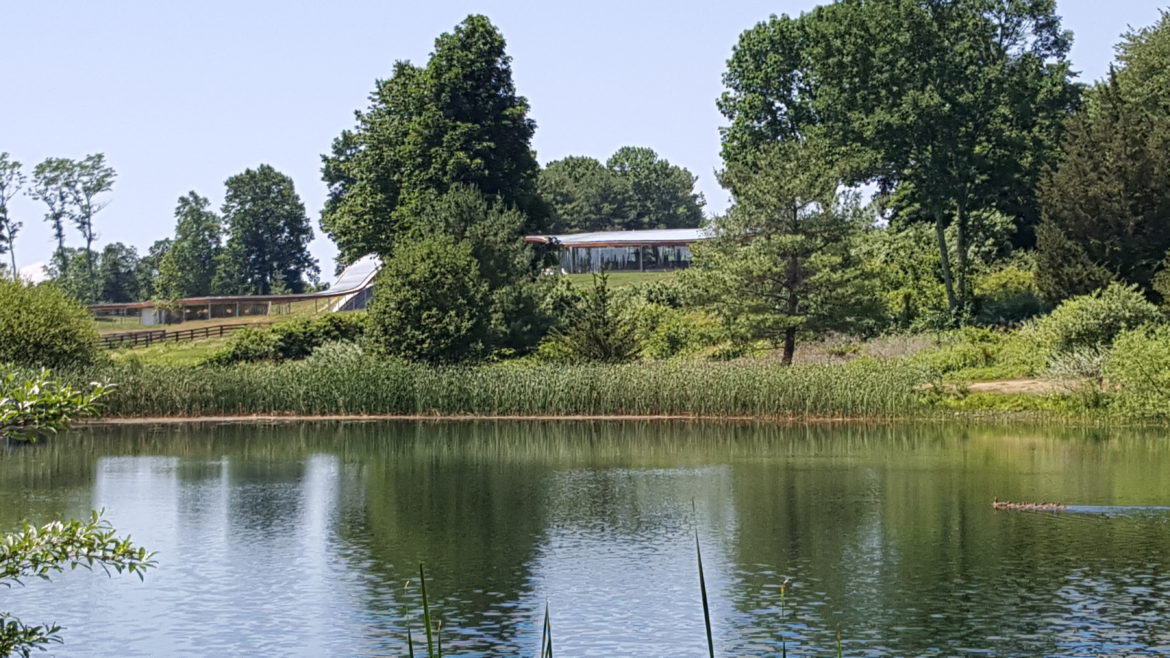Grace Farms must obtain formal permission before pursuing further activities on its Lukes Wood Road campus that could affect wetlands that are under federal jurisdiction, officials said in a new report.
Following a months-long investigation into unauthorized activity, the Army Corps of Engineers determined that a “contractor plan-revision error,” though unintentional, “resulted in minor encroachment into a wetland area,” according to a Dec. 6 memo from the federal agency.
Specifically, rocks or “riprap,” which typically are used as part of an erosion control system, encroached into a wetland that forms “an unnamed headwater tributary of the Fivemile River,” according to the agency’s findings.
Because the Army Corps didn’t learn of the activity there until after construction at Grace Farms, the federal agency warned that “any future regulated work that is undertaken without the required authorization or self-certification is considered a repeat or flagrant violation of the Clean Water Act.”
Such violation “may be subject to legal action by this office,” according to an accompanying Dec. 6 letter to Grace Farms Foundation Chair and President Sharon Prince from Kevin Kotelly, chief of the Permits & Enforcement Branch of the Army Corps’ Regulatory Division.
Ultimately, Grace Farms put in for an after-the-fact permit.
Asked for a comment on the matter, Edward O’Hanlan, an attorney for the Grace Farms Foundation, said in a statement: “The area the [Army Corps of Engineers] was concerned about, based on aerial photography, is an area around the rip-rap apron on the downhill side of the south wet basin that was altered significantly during construction in 2013-15. These soils were tested as part of the response to the [Army Corps of Engineers] inquiry, and found not to meet the state law definition of wetlands soil, which is more restrictive than the federal law definition used by the [Army Corps of Engineers]. For this reason, and because there is no impact on the wetland resources that both federal and state law seek to protect, the [Army Corps of Engineers] self-reporting permit option was used to respond to this inquiry, and no report was either required or made to the local wetlands agency.”
The federal agency’s findings came following a 10-month investigation by the Army Corps that was initiated by an allegation brought by a neighbor of the Lukes Wood Road property. According to correspondence cited by the Army Corps in its memo, David Markatos of Smith Ridge Road said that more than 60,000 square feet of fill was placed, including in a wetlands, and about six acres of wetlands were impacted by the development of Grace Farms.
The Army Corps desktop review included looking at aerial documentation, past permits and correspondence, site development plans, interviews with municipal officials and a history of the property.
The site historically saw “little change” from 1991 to the start of construction at Grace Farms in August 2013, the Army Corps said.
“After conducting a remote reconnaissance between 2012 and 2018 on the subject parcel, we determined that there were two areas of potential disturbance that required closer analysis,” the Army Corps said. Those areas are located on the eastern part of the construction site, the agency said.
Ultimately, the Army Corps determined, the adverse environmental impact there was “minimal.”
“The option for authorization as an after-the-fact activity is available, and it is appropriately used in this case, to avoid unwarranted disturbance to an aquatic resource area that has already begun to recover,” the agency said.
Even so, the Markatos and his wife, Jennifer Holme, in a letter to the members of the New Canaan Inland Wetlands Commission and municipal staff on Sunday note that under federal law they have “explicit federal consultation rights on any regulated activity impacting our property.”
“No formal or informal request for jurisdictional determination was ever made by Grace Farms Foundation with respect to its development activities at Grace Farms,” the neighbors wrote in their letter.
“With a commercial development project as large as Grace Farms—15,100 cubic yards of cut and 78,400 cubic yards of fill—and with an extensive roster of experts retained to manage this commercial development, we cannot comprehend how a material requirement such as an Army Corps jurisdictional determination was inadvertently missed,” Markatos and Holme said in the letter.
The Army Corps noted in its findings that Grace Farms had been “fully cooperative” with the agency’s investigation and that “all of the documentation we reviewed adequately demonstrated that it was never the intention of the owner to discharge fill in wetland in association with the completed activity.”
Grace Farms, its neighbors and the town have been involved in a number of lawsuits, including ongoing litigation, since the organization opened to the public about three years ago.
It isn’t clear whether or how the Army Corps report will affect a lawsuit brought by a different set of neighbors who say Grace Farms and Prince are responsible for sediment, silt and turbid water entering a wetlands, stream and pond on their properties.

